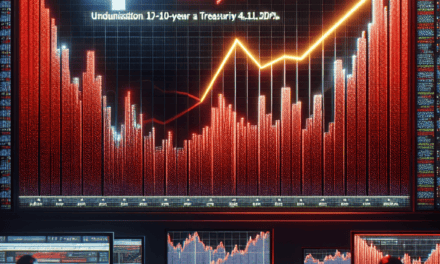“Bitcoin Soars to New Heights: Trump’s Win Fuels Crypto’s Meteoric Rise!”
Introduction
Bitcoin has experienced a significant surge, surpassing the $82,000 mark, following the unexpected victory of Donald Trump in the recent elections. This development has invigorated the cryptocurrency market, as investors and analysts alike reassess the potential implications of Trump’s win on the global financial landscape. The surge in Bitcoin’s value highlights the growing confidence in digital currencies as a hedge against traditional market volatility and political uncertainty. As the world watches the unfolding political scenario, the cryptocurrency market is poised for further growth, with Bitcoin leading the charge in reshaping the future of finance.
Impact Of Political Events On Cryptocurrency Markets
The recent surge of Bitcoin past the $82,000 mark has captured the attention of investors and analysts alike, highlighting the profound impact political events can have on cryptocurrency markets. The catalyst for this remarkable rise was the unexpected victory of Donald Trump in the latest U.S. presidential election, which has sent ripples through the financial world, particularly within the realm of digital currencies. As political landscapes shift, so too do the dynamics of financial markets, and cryptocurrencies, with their decentralized nature, are uniquely positioned to respond to such changes.
Historically, political events have played a significant role in shaping market sentiments, and the cryptocurrency market is no exception. The election of a political figure like Trump, known for his unconventional policies and rhetoric, often leads to uncertainty in traditional markets. This uncertainty can drive investors to seek alternative assets, such as Bitcoin, which are perceived as being less susceptible to government influence and macroeconomic instability. Consequently, the recent election outcome has bolstered the appeal of cryptocurrencies as a hedge against political and economic unpredictability.
Moreover, Trump’s victory has reignited discussions around regulatory policies concerning digital currencies. During his previous tenure, Trump’s administration exhibited a cautious approach towards cryptocurrencies, with a focus on preventing their use in illicit activities. However, his return to power has sparked speculation about potential regulatory shifts that could either hinder or facilitate the growth of the crypto market. Investors are closely monitoring these developments, as regulatory clarity is a crucial factor in determining the long-term viability and adoption of cryptocurrencies.
In addition to regulatory considerations, the broader economic policies associated with Trump’s administration are likely to influence the cryptocurrency market. For instance, Trump’s emphasis on economic nationalism and potential trade tensions could lead to fluctuations in traditional currencies, thereby enhancing the attractiveness of Bitcoin as a store of value. Furthermore, any fiscal policies aimed at stimulating economic growth, such as tax cuts or increased government spending, could have inflationary effects, prompting investors to turn to Bitcoin as a hedge against currency devaluation.
The interplay between political events and cryptocurrency markets is further complicated by the global nature of digital currencies. Unlike traditional financial markets, which are often confined within national borders, cryptocurrencies operate on a global scale, transcending geopolitical boundaries. This characteristic allows them to be influenced by political developments in multiple regions simultaneously. As a result, while Trump’s victory has had a pronounced impact on Bitcoin’s recent surge, other international political events, such as regulatory changes in major economies like China or the European Union, could also play a significant role in shaping the future trajectory of the cryptocurrency market.
In conclusion, the recent surge of Bitcoin past $82,000 following Trump’s victory underscores the intricate relationship between political events and cryptocurrency markets. As investors navigate this evolving landscape, they must remain vigilant to the myriad of factors that can influence digital currencies, from regulatory shifts to broader economic policies. The decentralized and global nature of cryptocurrencies positions them uniquely in the financial ecosystem, offering both opportunities and challenges in the face of political change. As such, understanding the impact of political events on cryptocurrency markets is essential for investors seeking to capitalize on the potential of digital assets in an increasingly interconnected world.
Analyzing Bitcoin’s Price Surge Post-Election
In the wake of the recent U.S. presidential election, Bitcoin has experienced a remarkable surge, surpassing the $82,000 mark. This unprecedented rise in value has been largely attributed to the victory of former President Donald Trump, which has significantly boosted the outlook for cryptocurrencies. As investors and analysts scramble to understand the implications of this development, it is essential to delve into the factors contributing to Bitcoin’s meteoric rise and the broader impact on the cryptocurrency market.
To begin with, the election of Donald Trump has introduced a wave of uncertainty in traditional financial markets. Historically, periods of political upheaval and economic unpredictability have driven investors to seek alternative assets, and Bitcoin, with its decentralized nature, has often been perceived as a safe haven. Trump’s victory has reignited discussions around deregulation and tax reforms, which could potentially favor the growth of digital currencies. Consequently, investors are increasingly viewing Bitcoin as a hedge against potential inflation and currency devaluation, further fueling its demand.
Moreover, the global economic landscape has been undergoing significant shifts, with central banks around the world adopting more accommodative monetary policies. The persistent low-interest-rate environment has diminished the appeal of traditional savings and bonds, prompting investors to explore more lucrative opportunities. Bitcoin, with its limited supply and deflationary characteristics, presents an attractive alternative. As a result, institutional investors, who were once skeptical of cryptocurrencies, are now entering the market in droves, adding legitimacy and driving up prices.
In addition to these macroeconomic factors, technological advancements and growing acceptance of blockchain technology have played a crucial role in Bitcoin’s price surge. The integration of blockchain into various sectors, from finance to supply chain management, has underscored the potential of cryptocurrencies beyond mere speculative assets. This increased adoption has not only enhanced Bitcoin’s credibility but has also paved the way for regulatory frameworks that support its growth. As governments and financial institutions continue to explore blockchain applications, the long-term prospects for Bitcoin appear increasingly promising.
Furthermore, the role of social media and influential figures in shaping market sentiment cannot be overlooked. High-profile endorsements and discussions around Bitcoin have amplified its visibility and appeal to a broader audience. Platforms like Twitter and Reddit have become hotbeds for cryptocurrency discourse, where news and opinions spread rapidly, influencing investor behavior. The recent election has only intensified these discussions, with many speculating on the potential policy shifts that could impact the crypto market.
While the current surge in Bitcoin’s price is undoubtedly impressive, it is important to approach this development with a degree of caution. The cryptocurrency market is notoriously volatile, and past trends have shown that rapid price increases can be followed by equally swift corrections. Investors must remain vigilant and consider the inherent risks associated with digital currencies. Diversification and a thorough understanding of market dynamics are essential for navigating this complex landscape.
In conclusion, Bitcoin’s surge past $82,000 following Trump’s election victory is a multifaceted phenomenon driven by political, economic, and technological factors. As the world grapples with the implications of this development, the cryptocurrency market stands at a pivotal juncture. Whether this marks the beginning of a new era for digital currencies or a temporary spike remains to be seen. However, what is clear is that Bitcoin’s role in the global financial ecosystem is becoming increasingly significant, warranting close attention from investors and policymakers alike.
The Role Of Government Policies In Crypto Valuation
The recent surge of Bitcoin past the $82,000 mark following Donald Trump’s electoral victory has reignited discussions about the intricate relationship between government policies and cryptocurrency valuations. This development underscores the significant impact that political events and government decisions can have on the volatile world of digital currencies. As Bitcoin continues to capture the attention of investors and policymakers alike, it is crucial to examine how government policies shape the crypto landscape and influence market dynamics.
To begin with, government policies play a pivotal role in determining the regulatory environment for cryptocurrencies. Regulations can either foster innovation and growth or stifle the development of digital assets. In the case of Trump’s victory, market participants are speculating that his administration may adopt a more favorable stance towards cryptocurrencies, potentially leading to regulatory reforms that could benefit the industry. Such optimism is often reflected in the market, as investors anticipate a more supportive regulatory framework that could drive further adoption and integration of cryptocurrencies into the mainstream financial system.
Moreover, government policies related to monetary and fiscal measures can also have a profound impact on cryptocurrency valuations. For instance, during times of economic uncertainty or inflationary pressures, investors often seek alternative assets to hedge against potential losses in traditional markets. Cryptocurrencies, particularly Bitcoin, have emerged as a popular choice due to their decentralized nature and limited supply. In this context, Trump’s victory may signal a shift in economic policies that could influence investor sentiment and drive demand for digital currencies as a store of value.
In addition to regulatory and economic factors, geopolitical considerations also play a crucial role in shaping the crypto market. Political events, such as elections, can lead to shifts in international relations and trade policies, which in turn affect global financial markets. The anticipation of changes in foreign policy under Trump’s leadership may have contributed to the recent surge in Bitcoin’s value, as investors assess the potential implications for global trade and economic stability. This highlights the interconnectedness of political developments and cryptocurrency valuations, as market participants react to the evolving geopolitical landscape.
Furthermore, government policies related to technological innovation and infrastructure development can also influence the growth and adoption of cryptocurrencies. Supportive policies that encourage research and development in blockchain technology can lead to advancements that enhance the functionality and security of digital currencies. In this regard, a government that prioritizes technological innovation may create an environment conducive to the growth of the crypto industry, thereby boosting investor confidence and driving market valuations.
It is also important to consider the role of central banks in shaping the crypto market. Central banks’ monetary policies, such as interest rate adjustments and quantitative easing measures, can have a direct impact on the attractiveness of cryptocurrencies as an investment. In scenarios where traditional currencies face devaluation or instability, cryptocurrencies may become more appealing to investors seeking to preserve their wealth. Consequently, any changes in central bank policies under Trump’s administration could have ripple effects on the crypto market, influencing investor behavior and market trends.
In conclusion, the recent surge of Bitcoin past $82,000 following Trump’s victory serves as a reminder of the complex interplay between government policies and cryptocurrency valuations. As the crypto market continues to evolve, understanding the multifaceted impact of political, economic, and technological factors will be essential for investors and policymakers alike. By closely monitoring these developments, stakeholders can better navigate the dynamic landscape of digital currencies and capitalize on emerging opportunities.
Investor Sentiment And Bitcoin’s Record Highs
In the wake of Donald Trump’s unexpected victory in the recent presidential election, Bitcoin has surged past the $82,000 mark, setting a new record high and capturing the attention of investors worldwide. This remarkable ascent in Bitcoin’s value can be attributed to a confluence of factors, chief among them being the shifting investor sentiment that has emerged in response to the political landscape. As investors seek to navigate the uncertainties of a Trump administration, many are turning to cryptocurrencies as a hedge against potential economic volatility and inflationary pressures.
The election outcome has reignited discussions about the role of cryptocurrencies in the global financial system. With Trump’s victory, there is a renewed focus on deregulation and economic policies that could potentially lead to increased market volatility. Consequently, investors are increasingly viewing Bitcoin as a safe haven asset, akin to gold, that can provide a buffer against traditional market fluctuations. This perception is further bolstered by Bitcoin’s decentralized nature, which offers a level of security and independence from government intervention that is particularly appealing in times of political uncertainty.
Moreover, the surge in Bitcoin’s value is not solely driven by domestic factors. On the international stage, geopolitical tensions and economic instability in various regions have also contributed to the growing appeal of cryptocurrencies. As traditional currencies face devaluation and central banks grapple with inflationary pressures, Bitcoin’s fixed supply and deflationary characteristics make it an attractive alternative for preserving wealth. This global perspective underscores the increasing interconnectedness of financial markets and the role of digital assets in providing a diversified investment strategy.
In addition to these macroeconomic factors, technological advancements and increased adoption of blockchain technology have played a significant role in Bitcoin’s meteoric rise. The growing acceptance of cryptocurrencies by major financial institutions and corporations has lent credibility to the asset class, encouraging more investors to enter the market. Furthermore, the development of regulatory frameworks in various jurisdictions has provided a level of legitimacy and security that was previously lacking, thereby fostering greater confidence among investors.
As Bitcoin continues to break new ground, it is essential to consider the potential risks and challenges that accompany such rapid growth. The volatility inherent in cryptocurrency markets remains a significant concern for investors, as price fluctuations can be swift and severe. Additionally, regulatory developments and government policies could impact the future trajectory of Bitcoin and other digital assets. Therefore, while the current investor sentiment is overwhelmingly positive, it is crucial for market participants to remain vigilant and informed about the evolving landscape.
In conclusion, Bitcoin’s surge past $82,000 following Trump’s victory highlights the complex interplay between political events, investor sentiment, and the burgeoning cryptocurrency market. As investors seek refuge from economic uncertainties, Bitcoin’s appeal as a decentralized and deflationary asset continues to grow. However, the path forward is fraught with challenges, and the need for careful consideration and strategic planning cannot be overstated. As the world watches this unprecedented development, the future of Bitcoin and its role in the global financial system remains a topic of keen interest and speculation.
Future Predictions For Bitcoin After Political Shifts
The recent surge of Bitcoin past the $82,000 mark has captured the attention of investors and analysts alike, as the cryptocurrency market responds to the political shifts following Donald Trump’s unexpected victory. This development has sparked a renewed interest in the potential future trajectory of Bitcoin, particularly in the context of political changes and their impact on the financial landscape. As we delve into the future predictions for Bitcoin, it is essential to consider the multifaceted factors that could influence its path.
To begin with, the political climate plays a significant role in shaping the economic environment, and Trump’s victory has introduced a new set of dynamics that could affect Bitcoin’s future. Historically, political uncertainty has often driven investors towards alternative assets, such as cryptocurrencies, as a hedge against traditional market volatility. In this context, Bitcoin’s decentralized nature and limited supply make it an attractive option for those seeking to diversify their portfolios amidst geopolitical shifts. Consequently, the current political landscape may continue to bolster Bitcoin’s appeal as a safe-haven asset.
Moreover, the regulatory environment surrounding cryptocurrencies is likely to evolve in response to these political changes. Under Trump’s administration, there may be a shift towards more favorable regulations for digital currencies, potentially fostering innovation and adoption within the sector. This could lead to increased institutional interest and investment in Bitcoin, further driving its value upwards. However, it is crucial to remain cautious, as regulatory unpredictability could also pose challenges for the cryptocurrency market, necessitating a careful analysis of policy developments.
In addition to political factors, technological advancements are poised to play a pivotal role in Bitcoin’s future. The ongoing development of blockchain technology and improvements in scalability and security could enhance Bitcoin’s functionality and usability, making it more accessible to a broader audience. As these technological innovations unfold, they may contribute to a more robust and resilient Bitcoin network, thereby strengthening its position in the global financial system.
Furthermore, the macroeconomic environment cannot be overlooked when considering Bitcoin’s future prospects. With inflationary pressures and concerns over fiat currency stability, Bitcoin’s fixed supply and deflationary nature present a compelling alternative for preserving wealth. As more individuals and institutions recognize the potential of Bitcoin as a store of value, its demand is likely to increase, potentially driving its price even higher.
It is also important to consider the role of market sentiment and investor behavior in shaping Bitcoin’s trajectory. The recent surge past $82,000 has undoubtedly fueled optimism among crypto enthusiasts, but it is essential to remain vigilant of market cycles and potential corrections. While the long-term outlook for Bitcoin appears promising, short-term volatility is an inherent characteristic of the cryptocurrency market, necessitating a balanced approach to investment strategies.
In conclusion, the future predictions for Bitcoin following Trump’s victory and the subsequent political shifts are influenced by a complex interplay of factors, including political, regulatory, technological, and macroeconomic elements. As these dynamics continue to evolve, Bitcoin’s role in the global financial landscape is likely to expand, offering both opportunities and challenges for investors. By staying informed and adaptable, stakeholders can navigate the uncertainties and capitalize on the potential growth of this transformative digital asset.
Comparing Bitcoin’s Performance In Different Political Climates
Bitcoin’s performance has often been influenced by various external factors, including political climates. The recent surge past $82,000 following Donald Trump’s victory is a testament to how political events can impact the cryptocurrency market. Historically, Bitcoin has shown a tendency to react to political changes, with varying degrees of volatility and growth. This latest development provides an opportunity to compare Bitcoin’s performance in different political climates and understand the underlying dynamics that drive its value.
In the past, Bitcoin has experienced significant fluctuations during periods of political uncertainty. For instance, during the 2016 U.S. presidential election, Bitcoin’s price saw a notable increase as investors sought refuge in decentralized assets amidst the unpredictability of the political landscape. Similarly, during the Brexit referendum, Bitcoin’s value rose as market participants anticipated economic instability in the United Kingdom and the European Union. These instances highlight a pattern where Bitcoin is perceived as a hedge against traditional financial systems during times of political upheaval.
Transitioning to the current scenario, Trump’s victory has once again underscored Bitcoin’s role as a safe haven asset. The market’s response suggests that investors are optimistic about the potential for favorable regulatory changes under Trump’s leadership, which could further legitimize and integrate cryptocurrencies into mainstream financial systems. This optimism is reflected in the surge past $82,000, marking a significant milestone in Bitcoin’s journey.
Moreover, comparing Bitcoin’s performance in different political climates reveals a broader trend of increasing acceptance and adoption. During periods of political stability, Bitcoin has often experienced steady growth, driven by technological advancements and institutional interest. For example, during the Biden administration, Bitcoin saw a gradual rise as regulatory clarity improved and major corporations began to embrace blockchain technology. This period of stability allowed for a more measured and sustained increase in Bitcoin’s value, contrasting with the sharp spikes observed during times of political uncertainty.
Furthermore, the global political landscape also plays a crucial role in shaping Bitcoin’s performance. In countries with restrictive monetary policies or economic instability, Bitcoin has emerged as a viable alternative for preserving wealth. For instance, in nations experiencing hyperinflation or currency devaluation, such as Venezuela and Zimbabwe, Bitcoin has provided a lifeline for citizens seeking to protect their assets. This demonstrates Bitcoin’s resilience and adaptability in diverse political environments, further solidifying its position as a global financial instrument.
In conclusion, Bitcoin’s recent surge past $82,000 following Trump’s victory highlights the cryptocurrency’s sensitivity to political climates. By examining its performance across different political scenarios, it becomes evident that Bitcoin thrives on both uncertainty and stability, albeit in different ways. During times of political upheaval, Bitcoin serves as a refuge for investors seeking to mitigate risks associated with traditional financial systems. Conversely, in stable political environments, Bitcoin benefits from technological advancements and increased institutional interest. As the world continues to navigate complex political landscapes, Bitcoin’s role as a dynamic and versatile asset is likely to persist, offering both challenges and opportunities for investors and policymakers alike. This intricate interplay between politics and cryptocurrency underscores the importance of understanding the broader context in which Bitcoin operates, as it continues to shape the future of finance.
The Influence Of Global Politics On Cryptocurrency Adoption
The recent surge of Bitcoin past the $82,000 mark has captured the attention of investors and analysts worldwide, highlighting the profound influence of global politics on cryptocurrency adoption. This remarkable increase in Bitcoin’s value follows the unexpected victory of Donald Trump in the latest U.S. presidential election, a development that has sent ripples through financial markets and reignited discussions about the role of cryptocurrencies in the global economy. As political landscapes shift, the interplay between governmental decisions and digital currencies becomes increasingly evident, underscoring the importance of understanding these dynamics for both seasoned investors and newcomers to the crypto space.
To begin with, the correlation between political events and cryptocurrency markets is not a novel phenomenon. Historically, periods of political uncertainty have often led to increased interest in decentralized financial systems. Cryptocurrencies, particularly Bitcoin, are perceived as a hedge against traditional market volatility and inflation, offering a decentralized alternative that is not directly influenced by any single government’s monetary policy. Trump’s victory, which many did not anticipate, has introduced a new wave of uncertainty, prompting investors to seek refuge in digital assets. This move towards Bitcoin and other cryptocurrencies is driven by a desire to mitigate risks associated with potential policy changes and economic instability.
Moreover, Trump’s presidency is expected to bring about significant shifts in regulatory approaches towards cryptocurrencies. During his previous term, Trump’s administration exhibited a cautious stance on digital currencies, with a focus on preventing their use in illicit activities. However, his recent campaign rhetoric suggested a more open attitude towards fostering innovation in the blockchain sector. This potential policy shift has fueled optimism among crypto enthusiasts, who anticipate a more favorable regulatory environment that could spur further adoption and integration of cryptocurrencies into mainstream financial systems.
In addition to domestic policies, Trump’s foreign policy agenda is likely to impact global cryptocurrency markets. His approach to international trade and relations could lead to fluctuations in traditional currencies, thereby enhancing the appeal of Bitcoin as a stable store of value. For instance, any escalation in trade tensions or geopolitical conflicts could undermine confidence in fiat currencies, prompting individuals and institutions to diversify their portfolios with digital assets. This trend is particularly relevant in regions with unstable economies, where cryptocurrencies offer a viable alternative to preserve wealth and facilitate cross-border transactions.
Furthermore, the broader implications of Trump’s victory on global economic policies cannot be overlooked. As countries navigate the complexities of a rapidly evolving financial landscape, the adoption of cryptocurrencies may accelerate as governments and central banks explore digital currencies as part of their monetary strategies. This shift towards digital finance is likely to be influenced by the need for more efficient, transparent, and secure financial systems, which cryptocurrencies inherently provide.
In conclusion, the recent surge in Bitcoin’s value following Trump’s electoral victory underscores the intricate relationship between global politics and cryptocurrency adoption. As political events continue to shape economic landscapes, the role of digital currencies in providing stability and innovation becomes increasingly significant. Investors and policymakers alike must remain vigilant in understanding these dynamics, as the future of finance is poised to be heavily influenced by the evolving interplay between traditional systems and emerging digital technologies. The ongoing developments in this space will undoubtedly have far-reaching implications, shaping the trajectory of global financial markets for years to come.
Q&A
1. **What event led to Bitcoin surging past $82,000?**
Bitcoin surged past $82,000 following Donald Trump’s victory.
2. **How did Trump’s victory impact the cryptocurrency market?**
Trump’s victory boosted the overall outlook for cryptocurrencies, leading to increased investor confidence and demand.
3. **What was the market sentiment towards Bitcoin after the surge?**
The market sentiment was positive, with investors optimistic about Bitcoin’s potential for further gains.
4. **Did other cryptocurrencies experience similar gains following the surge?**
Yes, other cryptocurrencies also experienced gains, although Bitcoin’s surge was the most notable.
5. **What factors contributed to the increased demand for Bitcoin?**
Factors included increased investor confidence, geopolitical uncertainty, and a favorable regulatory environment.
6. **How did financial analysts react to Bitcoin’s price increase?**
Financial analysts were generally optimistic, with some predicting further increases in Bitcoin’s value.
7. **What potential risks were identified despite the surge in Bitcoin’s price?**
Potential risks included market volatility, regulatory changes, and the possibility of a market correction.
Conclusion
Bitcoin’s surge past $82,000 following Trump’s victory highlights the cryptocurrency’s sensitivity to political events and its growing role as a hedge against traditional financial markets. This milestone underscores increased investor confidence in Bitcoin as a store of value and a speculative asset, potentially boosting its adoption and integration into mainstream financial systems. The event also reflects broader market dynamics where geopolitical developments can significantly influence digital asset valuations, suggesting a promising outlook for the crypto market as it continues to mature and attract institutional interest.





